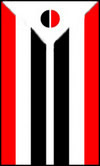Lesson Twenty-SevenReflexives and Reciprocals
In English, we can say, 'I see myself.' In Arapaho, to indicate the 'self' part, a suffix is added to the end of the TA verb. The suffix is -eti, and the stress is always -etí-.
| nonóóhobé3en | I see you |
| nonóóhobetínoo | I see myself |
More examples with nonoohob- are:
| nonoohóbetí3i' | They see themselves. |
| níhnoohóbetín | You saw yourself(sg). |
| héétnoohóbetínoo | I will see myself. |
| néíhoowunoohóbet | I do not see myself. |
| koononoohóbet | Do I see myself? |
| kóónecíínoohóbet | Do I not see myself? |
| koohuhcíínoohóbet | Did he not see himself? (Also kuh-) |
| koohéíhnoohóbetíbe | Did you see each other? (Also keih-) |
This suffix can be added to any TA verb with any number of people. Examples with too'ob- are:
| too'óbetí3i' | They hit each other |
| hoowto'óbet | He didn't hit himself |
| to'óbetí | Hit yourself! |
| tó'obetí' | Strike yourselves! |
| ceebéhto'óbetí' | Don't strike yourselves! |
| koohéétciito'obetíbe | Will you not strike yourselves? |
No exercises are available for this section yet, but you can:

